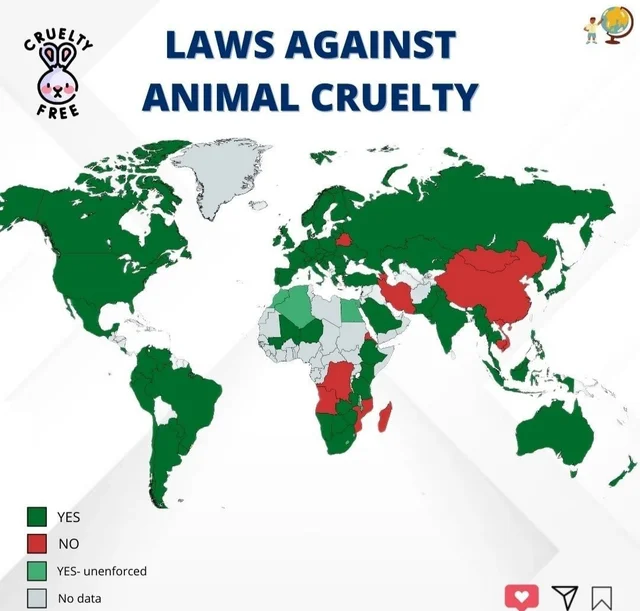Animal cruelty is an issue that transcends borders, cultures, and legal systems. As societies evolve, the recognition of the need to protect our fellow sentient beings has prompted various nations to enact and refine laws pertaining to animal welfare and cruelty. This article explores the multifaceted landscape of animal cruelty laws in different countries, elucidating their distinctions, enforcement, and the philosophical underpinnings that drive them.
In the United States, the legal framework surrounding animal cruelty is a patchwork quilt, varying extensively from one state to another. Some states have comprehensive laws that categorize certain acts of cruelty as felonies, while others impose minimal penalties, often relegating them to misdemeanors. For instance, states like California and Illinois have robust statutes addressing animal fighting, neglect, and abandonment. In contrast, states in the South may demonstrate more lax regulatory environments, reflecting cultural attitudes towards animals. Notably, the Animal Welfare Act provides a federal baseline, but it primarily applies to animals used in research and exhibition, exposing a significant gap for domestic pets and farm animals.
Across the Atlantic, the situation is markedly different in the United Kingdom. The Animal Welfare Act of 2006 serves as a formidable legislative framework, mandating that animals are provided with a suitable living environment, a proper diet, and the opportunity to exhibit normal behavior patterns. The legislation outlines offenses, ranging from neglect to deliberate harm, with stringent penalties for transgressors. Additionally, the UK has implemented the Animal Experimentation Act, which regulates the use of animals in research, reflecting a broader societal commitment to humane treatment.
In many European nations, animal rights laws are often reflective of a more advanced ethical stance regarding the treatment of animals. Germany is distinguished for its proactive approach, enshrined in its constitution, which recognizes animals as beings deserving of protection and respect. The country’s Animal Welfare Act is one of the most progressive globally, imposing a duty of care on pet owners and setting strict limits on animal usage in entertainment and agriculture.
Countries like Switzerland and Sweden exemplify a high level of commitment to animal welfare. Switzerland’s Animal Protection Act goes beyond mere prohibitions, emphasizing the obligation to prevent harm and suffering, while Sweden’s Animal Welfare Act mandates that animals must not be subjected to unnecessary suffering and that their emotional well-being must be taken into account. The proactive approach in these countries reflects a growing public consensus on the importance of dignity and welfare for animals.
In contrast, nations like China have faced criticism for their handling of animal welfare issues. While there exists no comprehensive animal protection legislation akin to that in Western nations, there is a burgeoning movement advocating for change. High-profile events, such as the Yulin Dog Meat Festival, have ignited condemnation both domestically and abroad. However, much of the regulatory framework remains undeveloped, and cultural practices relating to animal consumption complicate the enactment of comprehensive protective measures.
Australia presents a unique case study as well, with states and territories implementing their own laws concerning animal welfare. The Animal Welfare Acts in various states focus on preventing harm and promoting the proper treatment of animals, although inconsistencies in laws can lead to confusion and gaps in enforcement. The Australian public displays a growing discontent with animal suffering, evident in movements advocating for higher welfare standards in farming and entertainment industries.
Turning to Latin America, nations such as Brazil and Argentina have made notable strides in acknowledging animal rights. Brazil passed the Animal Protection Law in 1998, penalizing acts of cruelty and neglect. Similarly, Argentina’s Civil Code recognizes animals as sentient beings deserving of protection from torture or unjust treatment. However, enforcement in these countries can be sporadic, plagued by a lack of resources and public awareness. Activism in urban areas is on the rise, indicating a paradigm shift in the way society views animals.
In Africa, the oversight of animal welfare is increasingly gaining traction. Countries like South Africa possess comprehensive animal welfare legislation, with the Animal Protection Act aiming to eliminate unnecessary suffering. However, debates around cultural practices and economic reliance on certain animal industries tend to overshadow the implementation of these laws. In contrast, other nations may have little to no formal animal protection legislation, leaving animals vulnerable to neglect and abuse.
Internationally, organizations play a pivotal role in the campaign against animal cruelty, facilitating cross-border collaboration and advocacy. The World Animal Protection and The Humane Society International are examples of entities working tirelessly to elevate awareness and implement change. Their outreach often catalyzes local lawmakers to introduce or revise legislation aimed at enhancing the welfare of animals and increasing penalties for cruelty.
The landscape of animal cruelty laws across the globe is dynamic and reflective of broader social, ethical, and cultural considerations. While significant progress has been made in various countries, the journey toward universal protection of animal rights is far from complete. The diversity of legislation highlights the importance of local context in shaping the way societies perceive and treat animals.
Ultimately, awareness and education remain paramount in the fight against animal cruelty. By fostering a collective understanding of animal sentience and welfare rights, we can support and advocate for robust policies and legislation that protect these vulnerable beings, ensuring their dignity and well-being across all corners of the world.








